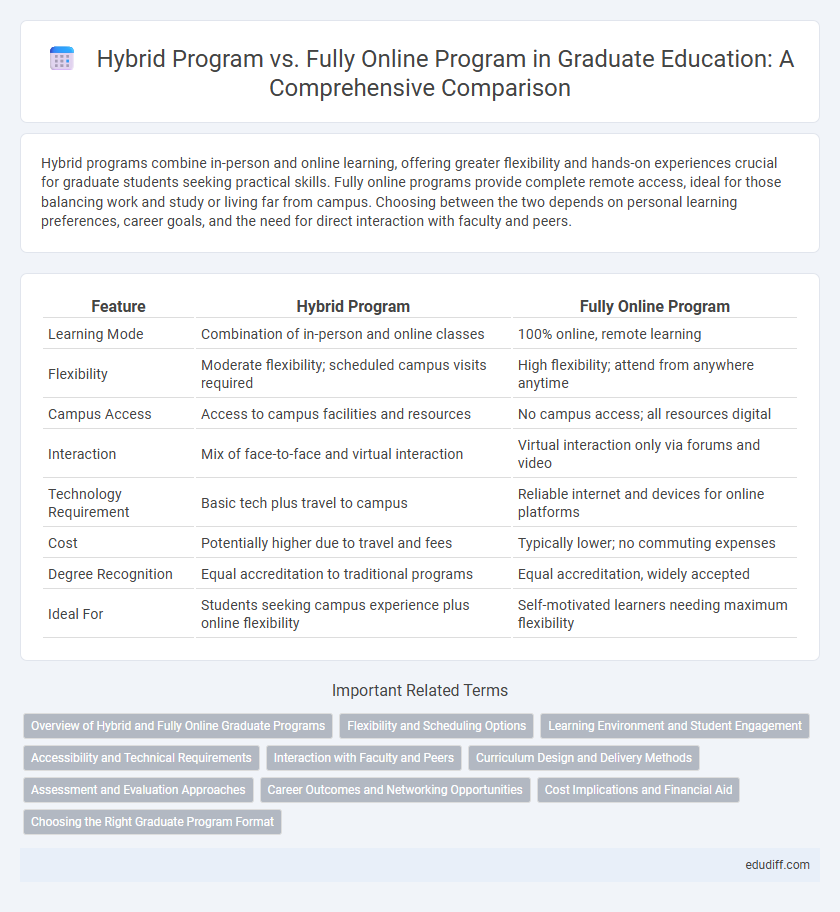Hybrid programs combine in-person and online learning, offering greater flexibility and hands-on experiences crucial for graduate students seeking practical skills. Fully online programs provide complete remote access, ideal for those balancing work and study or living far from campus. Choosing between the two depends on personal learning preferences, career goals, and the need for direct interaction with faculty and peers.
Table of Comparison
| Feature | Hybrid Program | Fully Online Program |
|---|---|---|
| Learning Mode | Combination of in-person and online classes | 100% online, remote learning |
| Flexibility | Moderate flexibility; scheduled campus visits required | High flexibility; attend from anywhere anytime |
| Campus Access | Access to campus facilities and resources | No campus access; all resources digital |
| Interaction | Mix of face-to-face and virtual interaction | Virtual interaction only via forums and video |
| Technology Requirement | Basic tech plus travel to campus | Reliable internet and devices for online platforms |
| Cost | Potentially higher due to travel and fees | Typically lower; no commuting expenses |
| Degree Recognition | Equal accreditation to traditional programs | Equal accreditation, widely accepted |
| Ideal For | Students seeking campus experience plus online flexibility | Self-motivated learners needing maximum flexibility |
Overview of Hybrid and Fully Online Graduate Programs
Hybrid graduate programs combine in-person classes with online coursework, offering flexibility and direct interaction with faculty and peers. Fully online graduate programs provide complete remote learning, ideal for students requiring maximum schedule adaptability and geographic independence. Both formats leverage digital platforms and resources, but hybrid models enhance experiential learning through occasional on-campus engagement.
Flexibility and Scheduling Options
Hybrid graduate programs combine in-person and online classes, offering greater flexibility for students balancing work and personal commitments by allowing on-campus attendance during select sessions. Fully online programs maximize scheduling freedom with asynchronous coursework accessible anytime, accommodating diverse time zones and individual pacing needs. Both models provide adaptable learning structures, but hybrid programs require more fixed scheduling, while fully online programs excel in self-paced, location-independent study.
Learning Environment and Student Engagement
Hybrid programs combine in-person and online learning environments, offering dynamic interaction and hands-on experiences that enhance student engagement and collaborative skills. Fully online programs provide flexible, self-paced learning with extensive digital resources, catering to diverse schedules but potentially limiting real-time peer interaction and immediate feedback. Research shows hybrid formats often yield higher student satisfaction and retention due to balanced engagement and structured support.
Accessibility and Technical Requirements
Hybrid graduate programs offer greater accessibility by combining in-person sessions with online components, accommodating students who prefer flexible on-campus engagement alongside remote learning. Fully online programs minimize geographic and schedule barriers entirely but often require robust internet access, up-to-date devices, and proficiency with learning management systems to navigate virtual classrooms effectively. Understanding these technical requirements is crucial for prospective students evaluating the best format to ensure uninterrupted access and successful graduate studies.
Interaction with Faculty and Peers
Hybrid graduate programs offer a balanced interaction with faculty and peers through both in-person and virtual sessions, enhancing collaborative learning and personalized feedback. Fully online programs rely on digital platforms for communication, which may limit spontaneous discussions but provide flexibility for diverse schedules. Effective hybrid models leverage synchronous and asynchronous tools to foster engagement, while fully online programs often implement virtual office hours and discussion boards to maintain faculty and peer interaction.
Curriculum Design and Delivery Methods
Hybrid programs blend in-person and online instruction, allowing for interactive campus experiences combined with flexible digital learning modules, which fosters practical skill application alongside theoretical knowledge. Curriculum design in hybrid programs emphasizes synchronous sessions, hands-on labs, and collaborative projects to enhance engagement and peer interaction. Fully online programs rely on asynchronous content, multimedia resources, and self-paced assignments, optimizing accessibility and personalized learning paths for diverse graduate students.
Assessment and Evaluation Approaches
Hybrid graduate programs combine in-person assessments such as proctored exams and presentations with online quizzes and discussion-based evaluations, providing a balanced approach to student performance measurement. Fully online programs primarily rely on digital assessments, including timed online tests, peer-reviewed assignments, and virtual presentations, leveraging technology to ensure academic integrity and flexibility. Both formats utilize formative and summative evaluations, but hybrid programs offer a wider range of assessment modalities to accommodate diverse learning styles.
Career Outcomes and Networking Opportunities
Hybrid graduate programs offer enhanced career outcomes by combining in-person networking events with online coursework, facilitating stronger professional connections and practical experience. Fully online programs provide flexibility but may limit direct interaction with peers and industry professionals, potentially impacting networking opportunities crucial for career advancement. Employers often value hybrid graduates for their demonstrated ability to balance remote learning with on-site collaboration, broadening job prospects.
Cost Implications and Financial Aid
Hybrid graduate programs typically incur higher costs due to campus facility fees and commuting expenses, whereas fully online programs often reduce or eliminate these costs. Financial aid availability varies, with hybrid programs potentially qualifying for both traditional campus-based and online-specific funding options, while fully online students may access a broader range of federal aid and employer tuition reimbursement plans. Understanding the cost structure and financial aid opportunities for each program type is crucial for prospective graduate students aiming to optimize their educational investment.
Choosing the Right Graduate Program Format
Choosing the right graduate program format depends on your learning style, career goals, and schedule flexibility. Hybrid programs combine in-person engagement with online coursework, offering networking opportunities and hands-on experiences, while fully online programs provide maximum convenience and accessibility. Evaluating factors such as interaction preferences, time management skills, and technological comfort helps ensure alignment with your educational objectives.
Hybrid Program vs Fully Online Program Infographic

 edudiff.com
edudiff.com